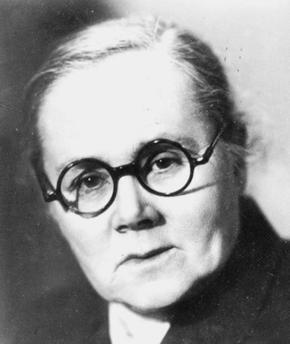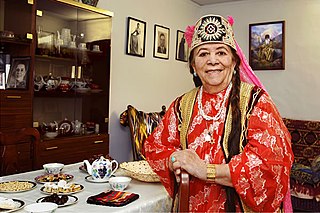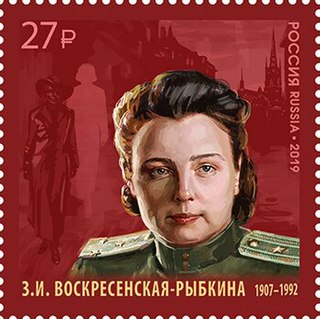
Dushanbe is the capital and largest city of Tajikistan. As of March 2024, Dushanbe had a population of 1,564,700, with this population being largely Tajik. Until 1929, the city was known in Russian as Dyushambe, and from 1929 to 1961 as Stalinabad, after Joseph Stalin. Dushanbe is located in the Gissar Valley, bounded by the Gissar Range in the north and east and the Babatag, Aktau, Rangontau and Karatau mountains in the south, and has an elevation of 750–930 m. The city is divided into four districts, all named after Persian historical figures: Ismail Samani, Avicenna, Ferdowsi, and Shah Mansur.

Zoya Anatolyevna Kosmodemyanskaya was a Soviet partisan. She was executed after acts of sabotage against the invading armies of Nazi Germany; after stories emerged of her defiance towards her captors, she was posthumously declared a Hero of the Soviet Union. She became one of the most revered heroines of the Soviet Union.

Margarita Iosifovna Aliger was a Soviet and Russian poet, translator, and journalist.
The International Skating Union has organised the World Allround Speed Skating Championships for Women since 1936. Unofficial championships were held in the years 1933–1935.

Sofya Aleksandrovna Yanovskaya was a Soviet mathematician, philosopher and historian, specializing in the history of mathematics, mathematical logic, and philosophy of mathematics. She is best known for her efforts in restoring the research of mathematical logic in the Soviet Union and publishing and editing the mathematical works of Karl Marx.
Shoista Mullojonova, born Shushana Rubinovna Mullodzhanova, was a renowned Tajik-born Bukharian Jewish Shashmaqam singer.
Zoya Alexandrovna Krakhmalnikova was a Russian Christian writer, of Ukrainian origin. She was an activist and former Soviet dissident who was repeatedly arrested by the authorities of the former Soviet Union for her publications. She was a recipient of the Andrei Sakharov Prize for Writer's Civic Courage.

Panir Ibragimova, better known by the stage name of Fatima Kuinova, was a Bukharan Jewish Shashmakom singer. She was named "Merited Artist of the Soviet Union".

Victoria Fyodorova was a Russian-American actress and author. She was born shortly after World War II to Jackson Tate (1898–1978), then a captain in the United States Navy, and Russian actress Zoya Fyodorova (1909–1981), who had a brief affair before Tate was expelled from Moscow by Joseph Stalin. Victoria Fyodorova wrote the 1979 book, The Admiral's Daughter, which was about her experience attempting to reunite with her father.

Zoya Alekseyevna Fyodorova was a Russian film star who had an affair with American Navy captain Jackson Tate in 1945 and bore a child, Victoria Fyodorova in January 1946. Having rejected the advances of NKVD police head Lavrentiy Beria, the affair was exposed resulting, initially, in a death sentence later reprieved to work camp imprisonment in Siberia; she was released after eight years. She was murdered in her Moscow apartment in 1981. The year before Fyodorova was murdered, she appeared in Moscow Does Not Believe in Tears, which won an Academy Award for Best Foreign Language Film in 1980.

Zoya Ivanovna Voskresenskaya was a Soviet diplomat, NKVD foreign office secret agent and, in the 1960s and 70s, a popular author of books for children. A USSR State Prize laureate (1968), Voskresenskaya was best known for her novels Skvoz Ledyanuyu Mglu and Serdtse Materi. In 1962–1980 more than 21 million of her books were sold in the USSR.

In January 1979, the Soviet Union conducted its first census in nine years. Between 1970 and 1979, the total Soviet population increased from 241,720,134 to 262,084,654, an increase of 8.4%.
Sa'diniso Hafizovna Hakimova was a Tajikistani obstetrician and gynecologist.
Turdikhon Ishonovna Berdieva was a Tajikistani linguist and Orientalist.
Khosiat Qosimovna Boboeva is a Tajikistani historian of the Soviet era.
Jonon Karimovna Bobokalonova was a Tajikistani writer, literary critic, and academic of the Soviet era. Her name is sometimes given as Jonon Karim.
Sorojon Mikhailovna Yusufova was a Tajik geologist and academic of the Soviet era.

Zoya Ivanovna Akimova née Parfyonova was a senior lieutenant and deputy squadron commander in the 46th Taman Guards Night Bomber Aviation Regiment during World War II. For completing 815 sorties during the war, she was awarded the title Hero of the Soviet Union on 18 August 1945, making her the only woman from Chuvashia to receive the title.

Tatyana Savelyevna Marinenko was a Soviet partisan and intelligence officer of the NKVD during the Second World War. After she was captured and tortured by the Germans in 1942 she was posthumously declared a Hero of the Soviet Union on 8 May 1965.

Zoya Fedorivna Klyuchko was a Ukrainian entomologist, lepidopterist, zoologist, professor and doctor of biological sciences. She focused on the research of faunistics; morphology; taxonomy and phylogeny of the scoop family Noctuidae, value as pests in rural areas plants and the role in nature in rare and disappearing insects. Klyuchko worked at the Taras Shevchenko National University of Kyiv, the I. I. Schmalhausen Institute of Zoology and the Pavlo Tychyna Uman State Pedagogical University and wrote between 130 and 160 scientific articles.











